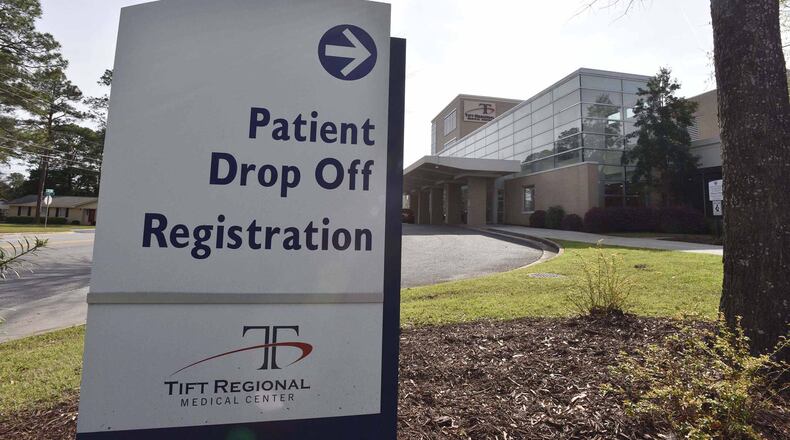The strength of our communities relies on hospitals. Think about what these facilities mean to you, your family and friends. It is hard to imagine not having a hospital nearby to attend to our health care needs.
If we need immediate medical care, where do we go? What is open 24 hours a day, seven days a week and treats everyone, regardless of ability to pay?
Yet, we drive by these institutions daily and many of us do not think twice until a medical emergency threatens our well-being.
“Georgia hospitals are the life blood of our communities,” said Georgia Hospital Association (GHA) Chair and Grady Health System CEO John Haupert. “The financial benefit of a local, thriving hospital is that it contributes to a strong economy. Hospitals employ thousands of Georgians and, at the same time, provide state-of-the-art health care.”
Georgia’s 180-plus hospitals generate billions of dollars for the economy every year.
“Hospitals benefit just about all of us, whether directly or indirectly. Aside from impressive statistics, like the delivery of more than 121,000 babies and admitting nearly 4.3 million emergency room visits in 2017, Georgia hospitals also contributed over $54 billion to local and state economies, according to the most recent economic impact report by GHA,” said Haupert.
In 2017, hospitals spent more than $23.4 billion to serve communities. These expenditures generated an estimated $54.7 billion in state and local economic activity, which translates to $2.34 for every $1 of hospital expenditures. The single largest expenditures are wages and salaries for hospital employees. In fact, hospitals are a major source of jobs in their communities. In 2017, hospitals directly provided more than 150,000 full-time jobs. When an employment multiplier is applied to this number, it indicates that hospitals supported an additional 370,000 full-time jobs in the state. The employment multiplier considers the “ripple effect” of direct hospital expenditures on the economy, such as medical supplies; durable medical equipment and pharmaceuticals; and retail establishments that depend on the hospital and its employees for business. When the directly and indirectly supported jobs are combined, over 520,000 jobs can be attributed to the presence of hospitals. This reflects 11.98 percent of all jobs in Georgia.
The GHA Economic Impact Report also measures hospitals’ direct economic contributions to Georgia’s working families. Using a household earnings multiplier, the report determined that hospitals generate more than $22.2 billion in household earnings in the state. The household earnings multiplier measures the increased economic contributions from individuals employed directly or indirectly by hospitals through daily living expenditures.
“Despite these contributions, many of our hospitals face extreme financial pressure,” said Haupert. “Each hospital is doing everything possible to ensure its stability and remain economically beneficial.”
Georgia residents who are uninsured or underinsured and unable to pay hospital bills continue to add to the uncompensated care challenges that hospitals, both rural and non-rural, face. In 2017, Georgia hospitals absorbed more than $2.1 billion in costs for care that was provided but not paid for. In the same year, Georgia’s uninsured rate was 15.4 percent, the fifth-highest in the nation behind Texas, Oklahoma, Florida and Alaska. The national average is 10.2 percent. Additionally, Medicaid pays Georgia hospitals only about 87 percent of actual costs, meaning hospitals lose 13 cents on every dollar spent treating a Medicaid recipient.
Unfortunately, many hospitals have been forced to close due to dire fiscal strain. Since 2012, nine Georgia hospitals have closed and others, especially those in rural areas, are fighting to keep their doors open.
The most recent Georgia Department of Community Health Hospital Financial Survey shows that, in 2017:
- 44 percent of all hospitals in Georgia had negative total financial margins; and
- 50 percent of all hospitals in Georgia showed operating losses on direct patient care.
“It is extremely important that our rural hospitals remain open,” added Haupert. “It is unfortunate that some Georgians have to travel extreme distances to receive quality health care.”
In addition to the financial pressures hospitals face, shortages in physicians, nurses and other areas have become quite an issue across the state.
“Our hospitals face many challenges on a daily basis,” said Haupert. “But the backbone of these facilities, the staff, do a fantastic job of treating patients and ensuring their well-being. Each hospital is filled with heroes who, like hospitals, contribute greatly to our communities.”
Earl Rogers is president of the Georgia Hospital Association. Founded in 1929, GHA represents more than 170 hospitals in Georgia with the goal of promoting the health and welfare of the public through development of better hospital care for all Georgia’s citizens.
About the Author
Keep Reading
The Latest
Featured



